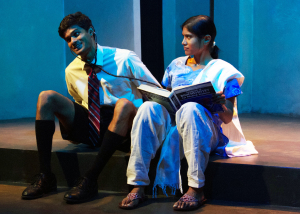Class, race and motherhood in ‘Samsara’
by Margaret Gray
 When women have babies, expectations are born at the same time — dream children, made up of assumptions and hopes, that grow up alongside the real ones.
When women have babies, expectations are born at the same time — dream children, made up of assumptions and hopes, that grow up alongside the real ones.
This is the premise of Lauren Yee’s bittersweet new comedy, “Samsara,” receiving its West Coast premiere in the new 49-seat space at Chance Theater, where Yee is resident playwright.
Inspired by a New York Times story about the commercial surrogacy business in India, Yee posits an infertile Northern Californian couple, Katie (Jennifer Ruckman) and Craig (James McHale), who hire a stranger in India, Suraiya (Anisha Adusumilli), to bear their child.
Katie and Suraiya’s fates are steered by the powerful expectations of their own mothers. Katie’s mother, who died young, had a thing for Maurice Chevalier, and Katie longs to watch their favorite film one day with a daughter of her own.
Craig agrees to surrogacy because Katie wants it; it’s the least expensive option. But then Katie, for reasons not immediately apparent, sends Craig to India to pick up the baby alone. She stays home and conducts an imaginary romance with her fantasy sperm donor, a chortling Frenchman (Jason Paul Evans) straight out of le cinema, then collapses into nightmares of a brown-skinned child babbling in “Indian” (also played by Adusumilli, with the help of startlingly quick costume changes).
Suraiya, meanwhile, plans to use her surrogacy earnings for medical school — her late mother’s dream for her. Estranged from her disapproving family, imprisoned in a clinic run by a sinister English doctor (Evans again), she creates her own fantasy relationship with the implanted fetus, which bounds into her imagination as Amit (Ray Parikh), an Indian man in short pants.
She tries to keep this curious, athletic, oversized child at a distance, introducing herself as the “microwave” warming him up for his real mother, but can’t resist a creeping affection for him.
Caught between these two lonely, imaginative women is the well-meaning but feckless Craig, who grapples with culture shock and his own discomfiting imperialism, not to mention incipient fatherhood, in this brave new world of reproductive outsourcing.
Yee has a deft hand with exposition, telescoping complicated setup into light, punchy scenes. Benjamin Kamine directs playfully, alert to irony: In tone and pace, the production often evokes “Modern Family” on a minimal set (by Bruce Goodrich).
If the fantasy characters feel at times gimmicky or precious — or even logistically puzzling — they are also handy, giving the characters plenty of opportunities to express darker impulses without compromising their likability.
The bold theatricality of Yee’s script keeps the audience engaged and giggling even through some bumpy spots. But at the end, an unexpected tragedy is presented in a light tone that risks trivializing the deeper questions raised by this promising play.
Leave a Reply
